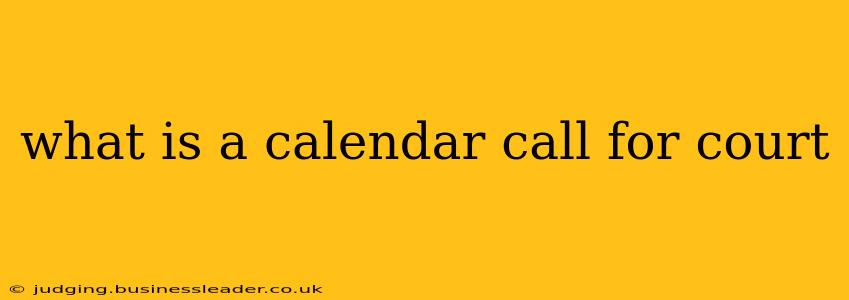A calendar call is a procedural step in many court systems where attorneys and/or parties appear before a judge or court clerk to discuss upcoming cases. It's not a full hearing on the merits of the case itself; instead, it's a preliminary administrative process designed to manage the court's docket and streamline the legal proceedings. Think of it as a scheduling meeting for the case.
What Happens During a Calendar Call?
The specific details of a calendar call vary depending on the jurisdiction and the type of court. However, common occurrences include:
- Setting Trial Dates: This is often the primary purpose. The judge or court clerk will schedule a trial date, or potentially identify a trial window, considering the court's schedule and the needs of all involved parties.
- Addressing Scheduling Conflicts: If there are scheduling conflicts (for example, a witness's unavailability or attorney conflicts), the calendar call provides a chance to resolve them proactively.
- Case Management: The judge might address any procedural matters, such as discovery deadlines, motions to be filed, or other administrative tasks related to keeping the case moving forward efficiently.
- Settlement Discussions: In some instances, calendar calls might offer an opportunity for brief settlement discussions, though it's not typically the main focus.
- Determining Readiness for Trial: The judge might assess whether the parties are prepared for trial, potentially requiring further actions before the scheduled trial date.
Who Attends a Calendar Call?
Generally, at least one attorney representing each party must attend the calendar call. Sometimes, parties themselves may be required to appear, particularly if it's a simpler case or if the judge wants to gauge their understanding of the process.
Why Are Calendar Calls Important?
Calendar calls serve several crucial functions:
- Efficiency: They streamline the court's workload and help ensure cases are managed efficiently.
- Fairness: By providing a structured way to address scheduling conflicts and other procedural matters, they aim to ensure a fair and timely resolution of disputes.
- Predictability: They offer all parties a more predictable timeline for the resolution of the case.
What if I Miss a Calendar Call?
Missing a calendar call can have serious consequences. It could lead to:
- Default Judgment: In some cases, failure to attend can result in a default judgment against you.
- Sanctions: The court may impose sanctions for failing to comply with court orders.
- Trial Delays: Your case could be significantly delayed, potentially impacting the outcome.
Always confirm the date, time, and location of your calendar call well in advance and ensure you or your attorney attends. If you have a legitimate reason for not attending, it's crucial to contact the court immediately to explain your situation and seek an alternative arrangement.
How Long Does a Calendar Call Last?
The duration of a calendar call varies considerably. It can range from a few minutes for straightforward cases to a much longer period if significant procedural issues need to be addressed.
How Do I Find Out About My Calendar Call?
You or your attorney will typically receive official notification of the date, time, and location of the calendar call from the court. This might be through a mailed notice, an email, or an electronic filing system.
This information provides a general overview. The specific procedures and practices regarding calendar calls can differ significantly depending on the location and the type of court. Always consult with an attorney or refer to your local court's rules for accurate and specific guidance.
